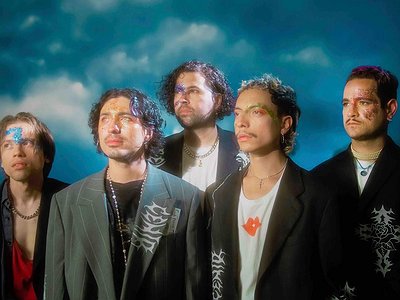Name: Divino Niño
Members: Camilo Medina (vocals, guitar), Javier Forero (vocals, bass ), Guillermo Rodriguez-Torres (guitar, vocals), Pierce Codina (drums, percussion)
Nationality: American-Columbian
Recent release: Divino Niño's latest single "Papelito" is out via Winspear. It is taken off their upcoming full-length album Last Spa on Earth, slated for release September 23rd 2022.
Recommendations: Javier: In terms of music, I have been really enjoying DJ sets by BADSISTA.
If you enjoyed this interview with Divino Niño and would like to find out more about the band and their music, visit their official website. They are also on Instagram, Facebook, and twitter.
When did you start writing/producing/playing music and what or who were your early passions and influences? What was it about music and/or sound that drew you to it?
Javier: I started writing music in like 2004 when I wrote a song a for my mom called “for emma”. It was the first track I recorded with Camilo. I remember thinking that my voice sounded really strange on the playback, but loved being able to playback something I made.
A lot of my early influences were emo/hardcore bands like the Chariot, Norma Jean, and mewithoutyou. I also got into Blink 182 cause Cam got me into it.
When I listen to music, I see shapes, objects and colours. What happens in your body when you're listening and how does it influence your approach to creativity?
Javier: When I listen to a good song my body inherits the feelings of that track. I just become intoxicated and get inspired to dance or make a track that reminds me of those feelings.
How would you describe your development as an artist in terms of interests and challenges, searching for a personal voice, as well as breakthroughs?
Javier: When I think of artistic development I think of time spent doing art or thinking about being creative. For me, it’s a skill that requires practicing everyday.
The more you repeat this process, the more you discover about your taste and it becomes easier to contribute to the practice in the way that you want to.
Tell me a bit about your sense of identity and how it influences both your preferences as a listener and your creativity as an artist, please.
Camilo: I like to keep my sense of identity as moldable as possible.
I’m into the idea of keeping my mind open of possible ways I can grow and change.
What, would you say, are the key ideas behind your approach to music and art?
Camilo: My approach feels self exploratory, like diving deep within to see what we’re hiding under the rug.
How would you describe your views on topics like originality and innovation versus perfection and timelessness in music? Are you interested in a “music of the future” or “continuing a tradition”?
Camilo: I think that music that feels timeless a lot of the time wasn’t made with that objective in mind.
What feels important for me right now is to connect with what feels exciting and refreshing at the moment and spend the hours necessary for the idea to reach its potential.
Over the course of your development, what have been your most important instruments and tools - and what are the most promising strategies for working with them?
Camilo: The ability to record voice memos and demos in the computer have been real important tools. The original idea for a song I think is crucial to have in raw form.
Take us through a day in your life, from a possible morning routine through to your work, please.
Camilo: Wake up and read for 30 mins while drinking coffee. Paint for 30 minutes. Stretch, meditate, eat a big meal and work on music for the rest of the day. At night go out dancing and socialize.
Listening can be both a solitary and a communal activity. Likewise, creating music can be private or collaborative. Can you talk about your preferences in this regard and how these constellations influence creative results?
Guillermo: One of the great joys of playing in a band is collaborating and creating a shared vision with good friends and deepening your bonds.
But there is also a serene bliss to be felt by singing a good song for your own ears only.
How do your work and your creativity relate to the world and what is the role of music in society?
Camilo: I like to think that the roll of art is to expand our understanding of reality, and potentially create a healthier relationship with one another.
How do you see the connection between music and science and what can these two fields reveal about each other?
Guillermo: In both fields it’s important to build on the information already gathered and to leave ample room for what you do not know.
Creativity can reach many different corners of our lives. Do you feel as though writing or performing a piece of music is inherently different from something like making a great cup of coffee? What do you express through music that you couldn't or wouldn't in more 'mundane' tasks?
Guillermo: When concentration, devotion, and thoroughness are summoned, even the most uncelebrated tasks are spiritual.
You must view every area of your life as an avenue for creative expression.
Music is vibration in the air, captured by our ear drums. From your perspective as a creator and listener, do you have an explanation how it able to transmit such diverse and potentially deep messages?
Javier: I am not really sure I can explain it. But this vibration in the air communicates feelings in ways that perhaps words can't explain.




